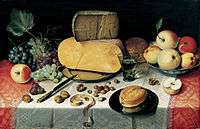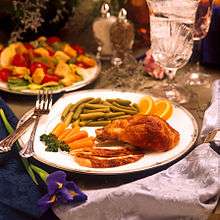Dinner
| Part of a series on |
| Meals |
|---|
 |
| Meals |
| Components and courses |
| Related concepts |

Dinner usually refers to the most significant meal of the day, which can be at noon or in the evening. However, the term "dinner" can have different meanings depending on culture, as it may mean a meal of any size eaten at any time of day.[1] Historically, it referred to the first meal of the day eaten around noon,[2] and is still sometimes used for a noon-time meal, particularly if it is a large or main meal. In many parts of the Western world, dinner is taken as the evening meal.[2]
Etymology
| Look up dinner in Wiktionary, the free dictionary. |
The word is from the Old French (c. 1300) disner, meaning "dine", from the stem of Gallo-Romance desjunare ("to break one's fast"), from Latin dis- (which indicates the opposite of an action) + Late Latin ieiunare ("to fast"), from Latin ieiunus ("fasting, hungry").[3][4] The Romanian word dejun and the French déjeuner retain this etymology and to some extent the meaning (whereas the Spanish word desayuno and Portuguese desjejum are related but are exclusively used for breakfast). Eventually, the term shifted to referring to the heavy main meal of the day, even if it had been preceded by a breakfast meal (or even both breakfast and lunch).
History
In Europe, the fashionable hour for dinner began to be incrementally postponed during the 18th century, to two and three in the afternoon, until at the time of the First French Empire an English traveler to Paris remarked upon the "abominable habit of dining as late as seven in the evening".[5] Dinners in the evening became more common in the 1700s, due to developments in work practices, lighting, financial status, and cultural changes.[2]
Time of day
In many modern usages, the term dinner refers to the evening meal, which is now often the most significant meal of the day in English-speaking cultures. When this meaning is used, the preceding meals are usually referred to as breakfast, lunch and tea.[2][6]
The divide between different meanings of "dinner" is not cut-and-dried based on either geography or socioeconomic class. However, the use of the term dinner for the midday meal is strongest among working-class people, especially in the English Midlands, North of England and the central belt of Scotland.[6] Even in systems in which dinner is the meal usually eaten at the end of the day, an individual dinner may still refer to a main or more sophisticated meal at any time in the day, such as a banquet, feast, or a special meal eaten on a Sunday or holiday, such as Christmas dinner or Thanksgiving dinner. At such a dinner, the people who dine together may be formally dressed and consume food with an array of utensils. These dinners are often divided into three or more courses. Appetizers consisting of options such as soup or salad, precede the main course, which is followed by the dessert.
A survey by Jacob's Creek, an Australian winemaker, found the average evening meal time in the U.K. to be 7:47pm.[7]
Dinner parties
.jpg)
A dinner party is a social gathering at which people congregate to eat dinner.[6]
Ancient Rome
During the times of Ancient Rome, a dinner party was referred to as a convivia, and was a significant event for Roman emperors and senators to congregate and discuss their relations.[8] The Romans often ate and were also very fond of fish sauce called liquamen (also known as Garum) during said parties.[9]
England
In greater London, England (c. 1875–c. 1900), dinner parties were sometimes formal occasions that included printed invitations and formal RSVPs.[10] The food served at these parties ranged from large, extravagant food displays and several meal courses to more simple fare and food service.[10] Activities sometimes included singing and poetry reciting, among others.[10]
See also
References
- ↑ Olver, Lynne. "Meal times". Lynne Olver. Retrieved 2 April 2014.
- 1 2 3 4 McMillan S (2001). "What Time is Dinner?". History Magazine. Retrieved 31 December 2017.
- ↑ Etymology of "dinner" from Online Dictionary. Accessed November 11, 2009.
- ↑ Etymology of "dine" from Online Dictionary. Accessed November 11, 2009.
- ↑ Quote in Ian Kelly, Cooking for Kings: the life of Antonin Carême the first celebrity chef, 2003:78. For guests of Talleyrand at the Château de Valençay, dinner under Carême was even later.
- 1 2 3 "Tea with Grayson Perry. Or is it dinner, or supper?". The Guardian. London. August 2012. Retrieved 2013-08-15.
- ↑ "Average dinner time is now 7:47pm as work hours eat into our meal times". Evening Standard. 3 October 2007.
- ↑ Edwards 2007, pp. 161–162.
- ↑ Oksman, Olga (2015-08-26). "Garum sauce: ancient Rome's 'ketchup' becomes a modern-day secret ingredient". the Guardian. Retrieved 2018-05-22.
- 1 2 3 Draznin 2001, pp. 134-136.
Bibliography
- Draznin, Y. (2001). Victorian London's Middle-class Housewife: What She Did All Day. ABC-Clio ebook. Greenwood Press. ISBN 978-0-313-31399-8.
- Edwards, C. (2007). Death in Ancient Rome. Yale University Press. ISBN 978-0-300-11208-5.
- McMillan, Sherrie (2001). "What time is dinner?". History Magazine. Retrieved 23 March 2015.
Further reading
- Nunn, J.J. (1872). Mrs. Montague Jones' dinner party: or, Reminiscences of Cheltenham life and manners.
- Inness, S.A. (2001). Dinner Roles: American Women and Culinary Culture. NONE Series. University of Iowa Press. ISBN 978-1-58729-332-0.
- Meiselman, H.L. (2009). Meals in Science and Practice: Interdisciplinary Research and Business Applications. Woodhead Publishing Series in Food Science, Technology and Nutrition. Elsevier Science. pp. 97–98. ISBN 978-1-84569-571-2.
External links
| Wikiquote has quotations related to: Dinner |
| Wikimedia Commons has media related to Dinners. |